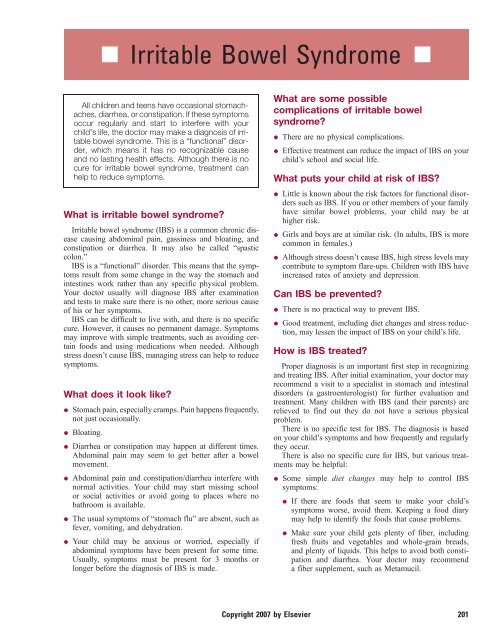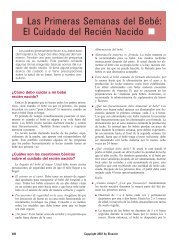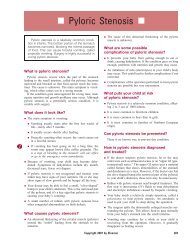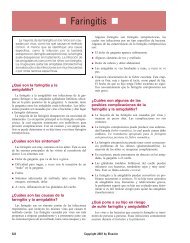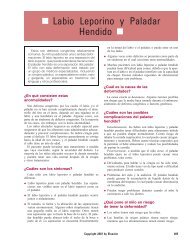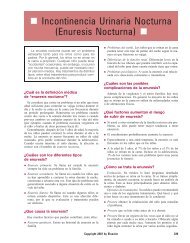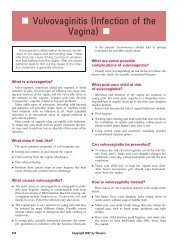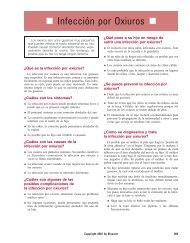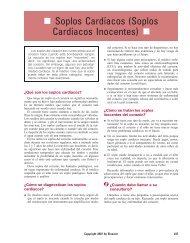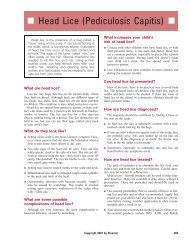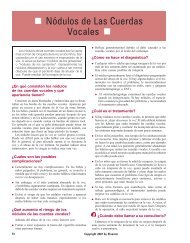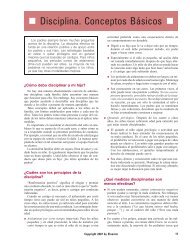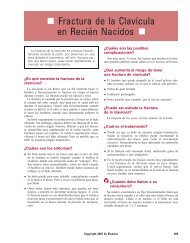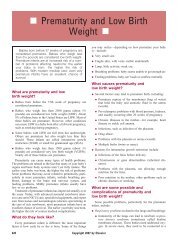Irritable Bowel Syndrome - Impcna.com
Irritable Bowel Syndrome - Impcna.com
Irritable Bowel Syndrome - Impcna.com
You also want an ePaper? Increase the reach of your titles
YUMPU automatically turns print PDFs into web optimized ePapers that Google loves.
n <strong>Irritable</strong> <strong>Bowel</strong> <strong>Syndrome</strong> n<br />
All children and teens have occasional stomachaches,<br />
diarrhea, or constipation. If these symptoms<br />
occur regularly and start to interfere with your<br />
child’s life, the doctor may make a diagnosis of irritable<br />
bowel syndrome. This is a “functional” disorder,<br />
which means it has no recognizable cause<br />
and no lasting health effects. Although there is no<br />
cure for irritable bowel syndrome, treatment can<br />
help to reduce symptoms.<br />
What is irritable bowel syndrome?<br />
<strong>Irritable</strong> bowel syndrome (IBS) is a <strong>com</strong>mon chronic disease<br />
causing abdominal pain, gassiness and bloating, and<br />
constipation or diarrhea. It may also be called “spastic<br />
colon.”<br />
IBS is a “functional” disorder. This means that the symptoms<br />
result from some change in the way the stomach and<br />
intestines work rather than any specific physical problem.<br />
Your doctor usually will diagnose IBS after examination<br />
and tests to make sure there is no other, more serious cause<br />
of his or her symptoms.<br />
IBS can be difficult to live with, and there is no specific<br />
cure. However, it causes no permanent damage. Symptoms<br />
may improve with simple treatments, such as avoiding certain<br />
foods and using medications when needed. Although<br />
stress doesn’t cause IBS, managing stress can help to reduce<br />
symptoms.<br />
What does it look like?<br />
Stomach pain, especially cramps. Pain happens frequently,<br />
not just occasionally.<br />
Bloating.<br />
Diarrhea or constipation may happen at different times.<br />
Abdominal pain may seem to get better after a bowel<br />
movement.<br />
Abdominal pain and constipation/diarrhea interfere with<br />
normal activities. Your child may start missing school<br />
or social activities or avoid going to places where no<br />
bathroom is available.<br />
The usual symptoms of “stomach flu” are absent, such as<br />
fever, vomiting, and dehydration.<br />
Your child may be anxious or worried, especially if<br />
abdominal symptoms have been present for some time.<br />
Usually, symptoms must be present for 3 months or<br />
longer before the diagnosis of IBS is made.<br />
What are some possible<br />
<strong>com</strong>plications of irritable bowel<br />
syndrome?<br />
There are no physical <strong>com</strong>plications.<br />
Effective treatment can reduce the impact of IBS on your<br />
child’s school and social life.<br />
What puts your child at risk of IBS?<br />
Little is known about the risk factors for functional disorders<br />
such as IBS. If you or other members of your family<br />
have similar bowel problems, your child may be at<br />
higher risk.<br />
Girls and boys are at similar risk. (In adults, IBS is more<br />
<strong>com</strong>mon in females.)<br />
Although stress doesn’t cause IBS, high stress levels may<br />
contribute to symptom flare-ups. Children with IBS have<br />
increased rates of anxiety and depression.<br />
Can IBS be prevented?<br />
There is no practical way to prevent IBS.<br />
Good treatment, including diet changes and stress reduction,<br />
may lessen the impact of IBS on your child’s life.<br />
How is IBS treated?<br />
Proper diagnosis is an important first step in recognizing<br />
and treating IBS. After initial examination, your doctor may<br />
re<strong>com</strong>mend a visit to a specialist in stomach and intestinal<br />
disorders (a gastroenterologist) for further evaluation and<br />
treatment. Many children with IBS (and their parents) are<br />
relieved to find out they do not have a serious physical<br />
problem.<br />
There is no specific test for IBS. The diagnosis is based<br />
on your child’s symptoms and how frequently and regularly<br />
they occur.<br />
There is also no specific cure for IBS, but various treatments<br />
may be helpful:<br />
Some simple diet changes may help to control IBS<br />
symptoms:<br />
If there are foods that seem to make your child’s<br />
symptoms worse, avoid them. Keeping a food diary<br />
may help to identify the foods that cause problems.<br />
Make sure your child gets plenty of fiber, including<br />
fresh fruits and vegetables and whole-grain breads,<br />
and plenty of liquids. This helps to avoid both constipation<br />
and diarrhea. Your doctor may re<strong>com</strong>mend<br />
a fiber supplement, such as Metamucil.<br />
Copyright 2007 by Elsevier 201
202 n <strong>Irritable</strong> <strong>Bowel</strong> <strong>Syndrome</strong><br />
It may help your child to eat frequent, smaller meals.<br />
Stress reduction can help in living with the symptoms<br />
of IBS. Lower stress levels can also help to reduce the<br />
frequency and severity of symptoms:<br />
Try not to let the symptoms interfere much with your<br />
child’s life. Simply knowing that the symptoms aren’t<br />
caused by a serious disease may help to reduce stress.<br />
Encourage your child to resume regular school and<br />
social activities.<br />
Encourage your child to engage in regular exercise<br />
and relaxation techniques.<br />
Medications may be helpful but generally should be used<br />
only for short periods. Your doctor may re<strong>com</strong>mend certain<br />
medications, including:<br />
Antispasmodics (drugs to reduce stomach cramps).<br />
Medications for diarrhea.<br />
Laxatives, especially bulk laxatives that work by adding<br />
extra fiber (such as Metamucil). Avoid stimulant<br />
laxatives.<br />
Antidepressants.<br />
Dealing with chronic pain. Techniques may include<br />
relaxation therapy, biofeedback, evaluation by a pain<br />
medicine specialist.<br />
Treatment for anxiety or depression, if present.<br />
Medical follow-up is an important part of treatment for<br />
IBS. Your doctor will likely re<strong>com</strong>mend regular visits<br />
to check for improvement or any other change in your<br />
child’s condition.<br />
It sometimes takes a while to determine the best <strong>com</strong>bination<br />
of treatments for a patient with IBS. The goal is to<br />
minimize your child’s symptoms and their impact on his<br />
or her life as much as possible.<br />
When should I call your office?<br />
During treatment for IBS, call our office if there is any<br />
sudden or significant change in your child’s symptoms,<br />
especially:<br />
Black, tarry-looking bowel movements.<br />
Vomiting.<br />
Weight loss.<br />
Copyright 2007 by Elsevier


